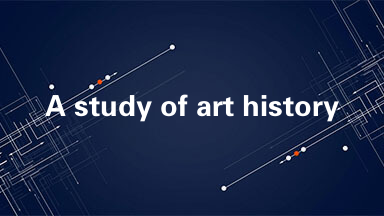
A study of art history might be a good way to learn more about a culture than is possible to learn in general history classes. Most typical history courses concentrate on politics, economics, and war. But art history focuses on much more than this because art reflects not only the political values of a people, but also religious beliefs, emotions, and psychology. In addition, information about the daily activities of our ancestors — or of people very different from our own — can be provided by art. In short, art expresses the essential qualities of a time and a place, and a study of it clearly offers us a deeper understanding than can be found in most history books.
In history books, objective(客观的) information about the political life of a country is presented; that is, facts about politics are given, but opinions are not expressed. Art, on the other hand, is subjective(主观的): it reflects emotions and opinions. The great Spanish painter Francisco Goya was perhaps the first truly “political” artist. In his well-known painting The Third of May, 1808, he criticized the Spanish government for its misuse of power over people. Over a hundred years later, symbolic images were used in Pablo Picasso’s Guernica to express the horror of war. Meanwhile, on another continent, the powerful paintings of Diego Rivera, Jose Clemente Orozco, and David Alfaro Siqueiros — as well as the works of Alfredo Ramos Martinez — depicted these Mexican artists’ deep anger and sadness about social problems.
In the same way, art can reflect a culture’s religious beliefs. For hundreds of years in Europe, religious art was almost the only type of art that existed. Churches and other religious buildings were filled with paintings that depicted people and stories from the Bible. Although most people couldn’t read, they could still understand biblical stories in the pictures on church walls. By contrast, one of the main characteristics of art in the Middle East was (and still is) its absence of human and animal images. This reflects the Islamic belief that statues are unholy(不圣洁的).
1. More can be learned about a culture from a study of art history than general history because art history ____________.
A. shows us the religious beliefs and emotions of a people in addition to political values
B. provides us with information about the daily activities of people in the past
C. gives us an insight into the essential qualities of a time and a place
D. all of the above
2. Art is subjective(主观的) in that _________.
A. a personal and emotional view of history is presented through it
B. it can easily rouse our anger or sadness about social problems
C. it will find a ready echo in our hearts
D. both B and C
3. Which of the following statements is true according to the passage?
A. Unlike Francisco Goya, Pablo Picasso and several Mexican artists expressed their political opinions in their paintings.
B. History books often reveal the compilers’ political views.
C. Religious art remained in Europe for centuries the only type of art because most people regarded the Bible as the Holy Book.
D. In the Middle East even today you can hardly find any human and animal figures on palaces or other buildings.
4. The passage mainly discusses __________.
A. the difference between general history and art history
B. the making of art history
C. what we can learn from art
D. the influence of artists on art history
5. It may be concluded from this passage that __________.
A. Islamic artists have had to create architectural decoration with images of flowers or geometric forms
B. history teachers are more objective than artists
C. it is more difficult to study art history than general history
D. people and stories from the Bible were painted on churches and other buildings in order to popularize the Bible
答案:
小题1:D
小题2:A
小题3:D
小题4:C
小题5:A
解析:
考点名称:人物传记类阅读
人物传记类文章的文体特征:
人物传记是记叙文体的一种,主要描写某人的生平事迹、趣闻轶事、生活背景、个性特征、成长奋斗历程等,包含记叙文的时间、地点、人物、事件等要素。其特点是以时间的先后或事件的发展为主线,空间或逻辑线索贯穿文章始终,脉络清楚,可读性较强。
考点名称:故事类阅读
故事类阅读概念:
这类文章一般描述的是某一件具体事情的发生发展或结局,有人物、时间、地点和事件。命题往往从故事的情节、人物或事件的之间的关系、作者的态度及意图、故事前因和后果的推测等方面着手,考查学生对细节的辨认能力以及推理判断能力。